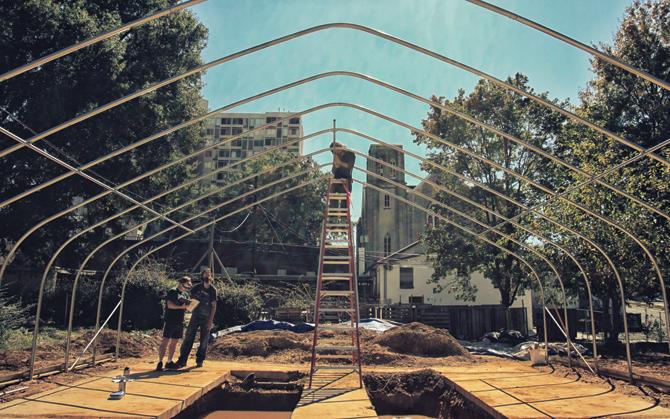
Steven Van Ginkel is a faculty leader of Tech’s Arkfab Green Phoenix initiative, a partnership with an Atlanta nonprofit that supports sustainable urban agriculture.
Steven Van Ginkel, a research engineer in the School of Civil and Environmental Engineering, was walking his dog along Peachtree Creek in Atlanta’s Buckhead neighborhood when he saw abandoned tires stuck in a sandbar. While some might have seen pollution, Van Ginkel saw building materials.
Van Ginkel is a faculty leader of Tech’s Arkfab Green Phoenix initiative, a partnership between Tech and Truly Living Well, an Atlanta nonprofit that supports sustainable urban agriculture. The Ford Motor Company Fund provided $50,000 to the initiative, which is enhancing the Wheat Street Garden next to the Martin Luther King Jr. Center in Atlanta (pictured at right).
A team of Tech students and faculty members had planned to construct a sustainable system to raise mushrooms, vegetables and fish in the garden. The building for the mushrooms needed to be well insulated, and it needed to be cheap.
Van Ginkel was struggling with that challenge when he happened upon the trashed sandbar. In late summer, he led 20 students and other volunteers to salvage tires. “I had no idea we’d find 487,” Van Ginkel said. “There are likely more we didn’t see buried under the sand.”
The team is using the tires to build an “earthship,” which features walls of recycled tires surrounded by rammed earth. The large thermal mass of the structure moderates the interior temperature.
When finished, the structure will be used for mushroom cultivation. Beside it will be a greenhouse for fish and vegetables. Recycled food waste will be used in growing gourmet mushrooms, and mushroom compost will be fed to red wiggler worms, which, along with duckweed and algae, will provide food for tilapia in the greenhouse. Fish waste will be processed into plant food to grow salad greens.
Three Georgia Tech student groups—Georgia Tech Engineers Without Borders, Engineering Students for a Sustainable World and the Alpha Phi Omega service fraternity—are partnering on the construction.
Katie Wingrove, a third-year environmental engineering major, said she was excited to take part in the project because it touches on issues of social equality, economics, sustainable engineering and ecology.
“Arkfab could change the way people look at food in cities,” she said. “The potential research ideas are piling up. However, the spirit of volunteerism and community building is the foundation of the project. Research and volunteerism are intertwined.”
The structures will have solar panels and a system to collect rainwater. The gardens will provide as much as 500 pounds of fresh fish and vegetables per month to Atlanta families.
The team is a semifinalist in the Cleantech Open business competition. They’re hoping to win the grand prize—$250,000—to put toward building seven more Arkfab systems in other urban food deserts (areas with little or no access to healthy foods).
If they do win, Van Ginkel knows where to look for building materials.
“We’d like to take all of the waste tires in Atlanta and turn them into single-story, energy-efficient buildings,” Van Ginkel said. “They look great, too, since the tires are covered with adobe. You don’t even see the tires when the building is done.”
This story initially ran in the November issue of the Georgia Tech Alumni Magazine.